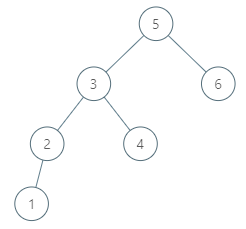285. Inorder Successor in BST
Description
Given the root of a binary search tree and a node p in it, return the in-order successor of that node in the BST. If the given node has no in-order successor in the tree, return null.
The successor of a node p is the node with the smallest key greater than p.val.
Example 1:

1 | Input: root = [2,1,3], p = 1 |
Example 2:

1 | Input: root = [5,3,6,2,4,null,null,1], p = 6 |
Constraints:
- The number of nodes in the tree is in the range
[1, 10^4]. -10^5 <= Node.val <= 10^5- All Nodes will have unique values.
Hints/Notes
- binary search tree
Solution
Language: C++
1 | /** |